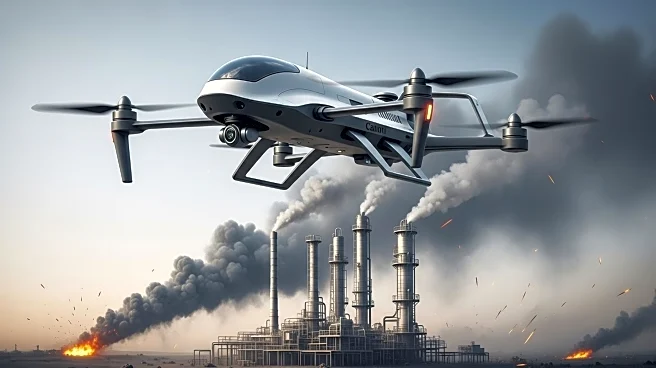What is the story about?
What's Happening?
Ukraine has intensified its efforts to disrupt Russia's war capabilities by targeting its oil industry through drone strikes. The Ukrainian military has been using domestically produced drones to hit Russian refineries, pipeline stations, and other economic assets, particularly those related to oil. This strategy aims to weaken Russia's financial resources, which are crucial for sustaining its military operations. The campaign has resulted in significant damage to Russian oil infrastructure, with reports indicating that more than a fifth of Russia's refining capacity has been destroyed. This has led to fuel shortages across Russia, affecting both domestic supply and export capabilities.
Why It's Important?
The Ukrainian strategy to target Russia's oil industry is significant as it directly impacts Russia's economic stability and its ability to fund military operations. By reducing Russia's oil exports and causing domestic shortages, Ukraine is effectively applying economic pressure, which could influence the course of the war. This approach also highlights Ukraine's shift from dependency on foreign weapons to developing its own military technology, showcasing resilience and innovation. The strategy has garnered support from European allies, who are investing in Ukraine's drone production capabilities, further strengthening Ukraine's position in the conflict.
What's Next?
Ukraine's continued focus on disrupting Russia's oil industry is likely to persist, with potential expansion of drone capabilities and further strikes on key economic targets. European allies may increase their support, both financially and technologically, to bolster Ukraine's efforts. The situation could lead to increased diplomatic pressure on Russia, potentially influencing negotiations or altering military strategies. Additionally, the impact on global oil markets and environmental concerns related to damaged infrastructure may prompt international responses.
Beyond the Headlines
The ethical implications of targeting economic infrastructure in warfare raise questions about the long-term consequences for civilian populations and environmental safety. The strategy also reflects a broader shift in warfare tactics, emphasizing economic disruption over direct military confrontation. This approach could influence future conflicts, as nations may increasingly target economic assets to achieve strategic objectives. The development of Ukraine's drone industry also signifies a potential shift in global military technology trends, with increased focus on autonomous and long-range capabilities.















